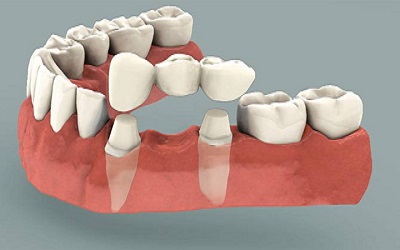Dental Implant vs Dental Bridge: Which is Best for You?

Dental treatments have come a long way in the last few decades. Loss of teeth can raise certain oral health concerns unless you adopt the proper replacement treatments. Dental implant and dental bridge are two options available to you. Before you decide, you need to know the differences between these two treatments. There are certain factors that favor one treatment over the other.
What is a Dental Implant?
Teeth basically have two parts: the crown which is the visible part and the root that is encased in bone and holds the tooth in place. In Dental Implant, the root is replaced by infusing a titanium implant to the bone of the jaw. Since the titanium bonds well with the bone over time, it helps prevent bone lose that would normally occur with any other type of tooth replacement. A crown is then attached to the implant which becomes a stand-alone tooth that functions and appears just like the tooth you have lost.
Advantages of Dental Implants:
- They are reliable, predictable, esthetic, functional.
- They do not affect adjacent teeth.
- They do not decay.
- They are less likely to cause gum disease.
Disadvantages of Dental Implants:
- They are comparatively expensive.
- They take more planning time.
- The implant process involves a minor surgery.
- They take time to heal before a permanent tooth can be replaced.
Dental Implant Treatment in Delhi
What is a Fixed Dental Bridge?
A fixed dental bridge is a permanent prosthesis attached to the remaining adjacent natural teeth. The artificial tooth or teeth literally bridge the gap between natural teeth. In order to accommodate the false tooth/teeth, the adjacent teeth are prepared by removing the enamel and replacing them with a crowns or caps. Due to their effectiveness and esthetic, fixed dental bridges have been a popular alternative for those who had lost teeth. However, this treatment is disadvantageous because the filing of the natural teeth on either side of the bridge may cause bacterial plaque accumulations, decay, periodontal disease, etc.
Advantages of Bridges
- They are quite affordable.
- They are esthetic, functional, predictable, reliable.
- The whole implant process takes less time.
Disadvantages of Bridges
- They involve removal of enamel of adjacent teeth.
- If adjacent teeth have crowns, they must be redone.
- They can result to tooth decay, periodontal disease and gum disease.
- You may require root canal treatment if nerves are affected.
- They are less durable than dental implants.
Leave a reply
You must be logged in to post a comment.








